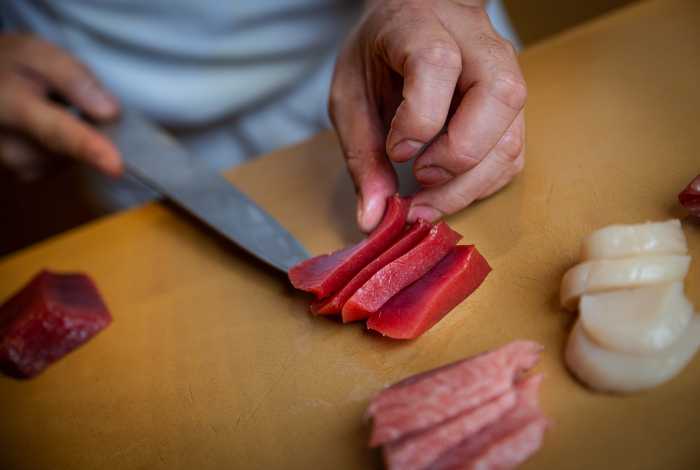At Citarella’s seafood counters, the most common question the fishmongers get is: How long do I cook it?
Joe Gurrera, the owner of the gourmet market chain, has noticed a lot of hesitation from home cooks when it comes to cooking seafood.
“I think people are intimidated, period,” says Gurrera, who’s been in the seafood business for more than 40 years and also owns the wholesale company Lockwood & Winant at the Fulton Fish Market and the hospitality seafood purveyor Meat Without Feet. “I want to teach people how to eat fish and take the intimidation out of cooking seafood.”
In his first cookbook, “Joe Knows Fish” ($24.99, Citarella Press), out now, he lays out the basics for preparing fish. That includes how long to cook it for, whether you’re baking, broiling, sautéing, poaching, frying or grilling it.
With it being prime grilling season, we asked Gurrera for his tips on the latter.
All about the heat
If you have access to an outdoor grill, Gurrera prefers charcoal over gas for grilling fish because it gets hotter than a gas flame.
Many New Yorkers don’t have space for an outdoor grill, and if you’re grilling inside, Gurrera uses a French cast-iron stovetop grill to get an even heat.
“Everything’s about the heat,” he says.
Two recommendations for starter fish
Beginners looking to fire up the grill for some fresh fish this summer should get swordfish or tuna steaks, Gurrera recommends.
“The structure is similar to a beef steak,” he says. “And everyone is familiar, I believe, with cooking a steak, so they shouldn’t be intimidated.”
From there, grillers could feel confident to move up to cooking salmon steaks or fillets, stronger-tasting fish like bluefish or even whole-fish cooking, such as with branzino, porgy or Portuguese sardines (just watch those bones).
Avoid delicate fish
There are some fish you shouldn’t attempt to grill.
“You can’t grill a delicate fish, like cod,” Gurrera says. “You could try to grill a whole flounder, but it’s got to be whole. It can’t be a thin fillet. It doesn’t work.”
Follow the timer
“It’s all about the time, it’s not about anything else,” says Gurrera, who recommends using a timer and not a thermometer.
If you’re grilling a one-pound whole fish, for example, you’d do five minutes on one side, and five minutes on the other.
“Don’t move it, don’t touch it,” Gurrera says. “Be patient, it will happen.”
For other fish like tuna or salmon, the timing will be shorter or longer depending on if it’s rare, medium-rare or well done.
Use quality ingredients
You’re likely not using anything beyond salt and olive oil to dress the fish. And as with most cooking rules of thumb, Gurrera advises using the best ingredients for your salt (he likes sea salt) and olive oil.
And, of course, you’ll want to use fresh, sustainably-sourced seafood.
“You have to trust your fishmonger,” Gurrera says.




































